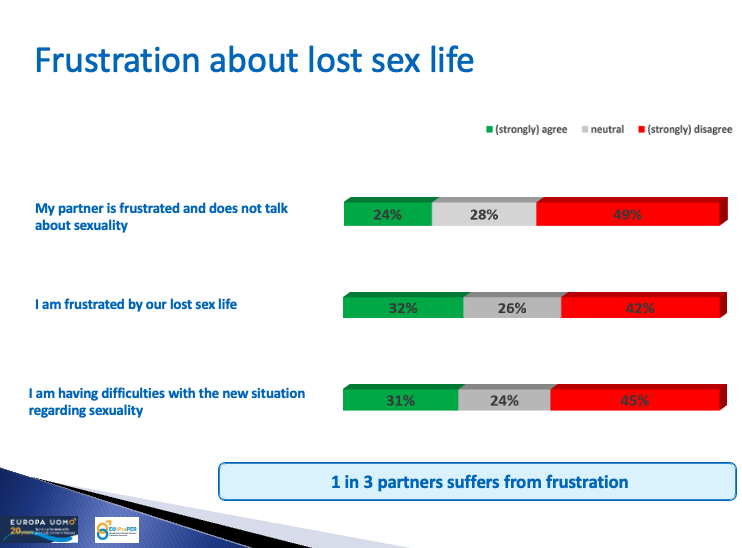Latest results from Europa Uomo’s partners’ quality of life study shows wide impact of disease
Europa Uomo’s ground-breaking survey of quality of life in partners of men with prostate cancer has found that many are frustrated with their lost sex life following a prostate cancer diagnosis. Three quarters of the 1,135 partners responding said that their sex life was better before prostate cancer.
At the same time, more than half said that their sex life was important to them. Just one fifth said they had no need for sex any more as a result their partner’s cancer.
Overall, one third said they were frustrated about their lost sex life, and that they were “having difficulties with the new situation” regarding sexuality.
These are the latest results being released from Europa Uomo’s EU-ProPER study (Europa Uomo Prostate Partners’ Experience Research) based on a targeted online survey available in 17 languages. The survey results provide a partners’ perspective on quality of life after prostate cancer, following Europa Uomo’s EUPROMS studies focusing on the patient experience.
“The study shows that prostate cancer definitely affects relationships, intimacy and sexual life,” says André Deschamps, who co-ordinated the survey for Europa Uomo. “Partners of prostate cancer have provided very honest and personal feedback, and the results demonstrate how profoundly the disease can affect the lives of loved ones.”
On the positive side, two thirds of respondents felt they could talk openly to their partners about sexual problems following treatment. However, it may be hard for partners to put the focus on their own feelings. Just 42% said that found it easy to express their own feelings about sex.
The respondents also provided information about their use of medications and devices to improve their sex lives. Two thirds said they were aware of the available devices to improve their sex life. However, 39% said their partner did not want to use any medication or device to improve his erection. These findings support those of the earlier EUPROMS studies.
“Further analysis of the EU-ProPER results is needed in order to understand the relationship between all the factors and what measures would improve the quality of life of partners,” said André Deschamps.

